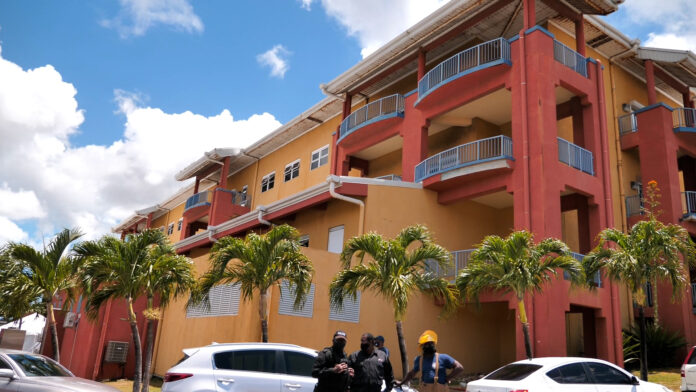Аdvеrtіѕе wіth thе most visited news site in Antigua and Barbuda ~ Wе оffеr fullу сuѕtоmіzаblе аnd flехіblе dіgіtаl mаrkеtіng расkаgеѕ. Yоur соntеnt іѕ dеlіvеrеd іnѕtаntlу tо thоuѕаndѕ оf uѕеrѕ іn Antigua аnd аbrоаd via our One Signal push notifications! Соntасt uѕ аt [email protected].
———————————————————————
Inner Sydney has reduced new HIV acquisitions by 88%, meaning it may be the first locality in the world to reach the UN target to end AIDS as a public health threat by 2030, according to data released today at IAS 2023, the 12th IAS Conference on HIV Science. CLICK HERE TO JOIN OUR WHATSAPP GROUP FOR NEWS UPDATES.
Andrew Grulich of the Kirby Institute at the University of New South Wales and member of the Governing Council of IAS – the International AIDS Society – presented the findings, citing progress in Inner Sydney, where HIV was once most prevalent in Australia, as evidence that stopping new HIV acquisitions is possible. Grulich attributed success in Inner Sydney in part to community outreach and prevention efforts, including widespread availability and use of HIV pre-exposure prophylaxis (PrEP).
The announcement comes just one week after the Kirby Institute released national surveillance data showing that new diagnoses of HIV among gay and bisexual men in Australia has fallen by 57% over the past decade.
“The extraordinary success in HIV prevention in the gay neighbourhoods of Sydney is due to decades of government leadership,” Grulich said. “Working in partnership with community and clinical organisations, effective research-based interventions have been designed and implemented. These numbers show us that virtual elimination of HIV transmissions is possible. Now, we need to look closely at what has worked in Sydney, and adapt it for other cities and regions across Australia.”
“These encouraging findings from inner city Sydney show just how far we have come since the early days of the AIDS pandemic before we had effective testing, treatment or prevention tools,” Sharon Lewin, IAS President, IAS 2023 International Chair and Director of the Peter Doherty Institute for Infection and Immunity at the University of Melbourne in Australia, said. “A durable end to Australia’s HIV epidemic requires a cure and a vaccine, and the scientific community won’t stop until we discover them.”
Nationwide progress toward ending HIV as a public health threat in Australia
Skye McGregor of the Kirby Institute presented a study showing that Australia is on track to achieve the UNAIDS 95-95-95 targets, which call for 95% of all people living with HIV to know their HIV status, 95% of all people diagnosed with HIV to receive sustained antiretroviral therapy, and 95% of all people receiving antiretroviral therapy to achieve viral suppression by 2025.
However, the study authors point out that continued success is not guaranteed. While Australia achieved the 90-90-90 targets in 2020 and saw declines in new HIV diagnoses during the COVID-19 crisis, achieving the more ambitious 95-95-95 targets will require increased efforts to diagnose people living with HIV earlier and immediately link them to ongoing care and treatment.
“As Australia stays on course to become one of the first countries to virtually eliminate HIV, the science produced here has the potential to inform the global HIV response,” said Charles Gilks, IAS 2023 Local Chair and Queensland Professorial Chair of BBVs and STIs at the University of Queensland, Australia. “Key to our national success has been a focus on prevention and on equitable access to care for anyone at risk of HIV, a winning strategy we are proud to share with the world.”
“Achieving the last mile of the virtual elimination of HIV in Australia will require additional interventions – including those specifically designed to reach women. While the gay, bi-sexual and men who have sex with men communities are very aware of the benefit of prevention tools like PrEP, the heterosexual community is pretty much oblivious. We need greater education – including as part of secondary school curricula – to raise awareness around how to prevent HIV, including new tools like long-acting injectable PrEP,” said Heather Ellis, a woman living with HIV and communications and engagement coordinator for Positive Women Victoria, Australia’s only fully funded community organisation supporting and advocating for women living with HIV.
Abstract and session: Australia’s progress towards ending HIV as a public health threat: trends in epidemiological metrics over 2004-2021, Progress towards HIV elimination: Are we there yet? (3538, Track C)
Use of HIV prevention tools increasing among gay and bisexual men in Australia, but younger men are more vulnerable to acquiring HIV
From 2017 to 2021, the percentage of gay and bisexual men in Australia reporting that they use effective HIV prevention tools increased from 69.8% to 75.1%, and HIV risk declined from 30.2% to 24.9%, influenced by rising PrEP use, according to a new study.
Presented by Martin Holt of the University of New South Wales, the study was based on survey responses from more than 25,800 men with casual male partners. Participants under 25 reported the highest level of vulnerability to HIV acquisition, but were also the most likely to consistently use condoms (25.4% in 2021). Meanwhile, 25 to 44 year olds were most likely to use PrEP (39% in 2021), and 45 year olds were most likely to rely on undetectable HIV viral load, also known as “treatment as prevention” (11.8% in 2021).
The study also found that during 2017 to 2021, the use of HIV prevention tools increased more in suburbs with more than 10% gay residents (73.4% to 88.3%) and less in suburbs with fewer than 10% gay residents (68.9% to 73.7%).
Researchers concluded that encouraging the use of effective prevention tools, particularly among younger men, is necessary to further reduce HIV infections in Australia.
Abstract and session: Increasing prevention coverage among Australian gay and bisexual men but elevated HIV risk among younger and bisexual men: analysis of national behavioural surveillance data 2017-21, Poster exhibition (1933, Track C)
Use of event-driven PrEP tripled in Australia between 2019 and 2022
Use of event-driven PrEP for HIV prevention tripled from 7.8% in 2019 – when it was first included in Australian PrEP guidelines – to 24.7% in 2022, according to data from Australia’s Gay Community Periodic Surveys. Event-driven or “on demand” PrEP involves taking two PrEP pills two to 24 hours before sex, followed by one pill 24 hours after the first dose and another pill 24 hours after the second dose.
Presented by Curtis Chan of the Kirby Institute, the study also found that compared to daily PrEP users, event-driven PrEP users were less likely to identify as gay (84.2% vs. 88.7%), have received an STI diagnosis in the last 12 months (29.4% vs. 38.5%), or have engaged in condomless anal sex with casual partners in the last six months (64.0% vs. 72.4%). Also, event-driven PrEP users were more likely to have reduced their PrEP use due to COVID-19 (60.8% vs. 46.5%).
The study team recommended continued tracking and analysis of event-driven PrEP use to assess the impact of COVID-19 as well as general uptake of this effective prevention strategy.
Abstract and session: Increased use of event-driven PrEP during COVID-19 in Australia: Results from behavioural surveillance 2019-2021, Differentiated service delivery with focus on PrEP (1421, Track C)
A study presented by George Taiaroa of the University of Melbourne aims to clarify the public health potential of molecular approaches to characterise HIV transmission in Australia. In some countries, molecular analyses are being used to complement traditional HIV surveillance and public health efforts by defining HIV transmission groups, allowing rapid, tailored delivery of HIV prevention, testing and treatment services.
The study analysed HIV sequences collected from 2000 to 2020 from newly diagnosed people living with HIV in Victoria, Australia. To protect privacy, all sequence and individual information was “de-identified,” meaning that they could not be linked to personally identifying information.
The study found that 70% of HIV sequences were part of a putative transmission group. Transmission groups showed changing patterns in growth, stabilisation and decline, providing further detail to support the control of these distinct but overlapping sub-epidemics.
Taiaroa and colleagues concluded that the results “provide local data to inform the ongoing discussions of the acceptability and place of molecular approaches in characterising HIV transmission and guiding public health responses in Australia.”
“This is one of the first Australian studies to use molecular epidemiology to sequence HIV and pinpoint clusters of infections. Importantly, the work was done in close partnership with communities affected by HIV,” Lewin said. “As we continue to see great success in Australia’s HIV response, these new tools can help provide greater precision to targeted local public health responses to ensure that we are reaching everyone who needs it with HIV prevention, testing and treatment.”
CLICK HERE TO JOIN OUR WHATSAPP GROUP FOR NEWS UPDATES.
Make a donation to help support ABN, via PayPal: [email protected]. Follow Antigua Breaking News on Twitter @ABNAntigua and Instgram @AntiguaBreakingNews and on Facebook. Send us a message on WhatsApp at 1-868-704-9864 or email us at [email protected].
JOIN OUR WHATSAPP GROUP FOR NEWS UPDATES: CLICK HERE.
JOIN OUR WHATSAPP GROUP FOR NEWS UPDATES: CLICK HERE.
JOIN OUR WHATSAPP GROUP FOR NEWS UPDATES: CLICK HERE.
JOIN OUR WHATSAPP GROUP FOR NEWS UPDATES: CLICK HERE.
JOIN OUR WHATSAPP GROUP FOR NEWS UPDATES: CLICK HERE.
JOIN OUR WHATSAPP GROUP FOR NEWS UPDATES: CLICK HERE.
JOIN OUR WHATSAPP GROUP FOR NEWS UPDATES: CLICK HERE.
JOIN OUR WHATSAPP GROUP FOR NEWS UPDATES: CLICK HERE.
JOIN OUR WHATSAPP GROUP FOR NEWS UPDATES: CLICK HERE.
JOIN OUR WHATSAPP GROUP FOR NEWS UPDATES: CLICK HERE.
JOIN OUR WHATSAPP GROUP FOR NEWS UPDATES: CLICK HERE.
JOIN OUR WHATSAPP GROUP FOR NEWS UPDATES: CLICK HERE.




















